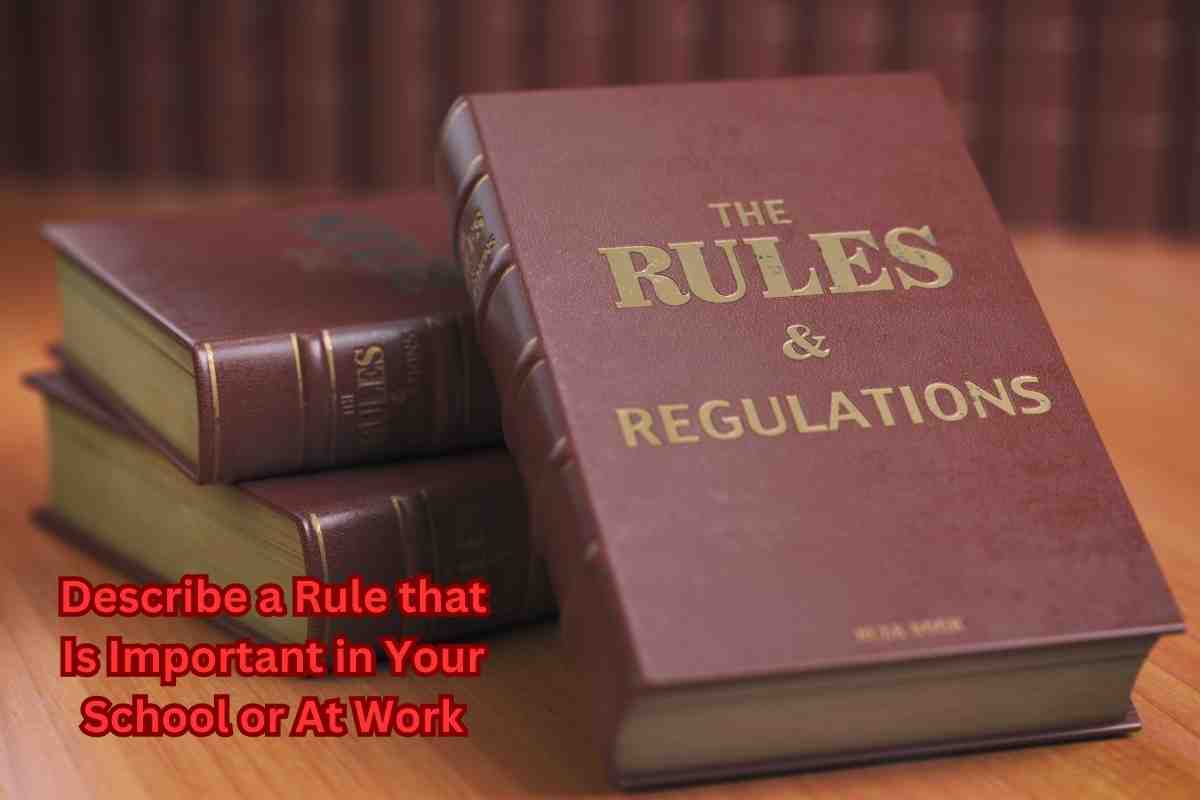Describe a rule that is important in your school or at work. You should say:
- What the rule is about?
- What happens when people break the rules?
- Why do you think it is an important rule?
- And explain how you feel about the rule.
Sample 1:- Describe a Rule that Is Important in Your School or At Work
At the multinational corporation where I facilitated training sessions for over a decade, a rule of paramount importance was the “Transparent Communication Policy.” This mandated that all team members, regardless of hierarchy, were encouraged, if not obligated, to voice concerns, ideas, or feedback openly during team meetings.
Violation of this rule, particularly by those in managerial positions, resulted in interventions. If a manager, for instance, stifled open dialogue or disregarded feedback, they would be counseled by senior leadership. Persistent disregard could lead to a reevaluation of their leadership role. Employees, on the other hand, were encouraged through various incentives to participate and communicate actively.
The cornerstone of this rule was the belief that open communication fosters innovation and addresses potential issues at their nascent stages. In an industry driven by innovation and teamwork, creating an environment where every voice is heard and valued can be the difference between project success and failure. This policy sought to obliterate the traditional silos that often exist in corporate structures, making way for a more collaborative and transparent work environment.
From my perspective, this rule was a game-changer. It not only empowered employees but also made leadership more accountable. While it posed challenges, especially for those accustomed to a more hierarchical structure, its long-term benefits in terms of team morale, innovation, and overall productivity were undeniable. It was a testament to the company’s commitment to progressive values and belief in its workforce’s collective power.
Sample 2:- Describe a Rule that Is Important in Your School or At Work
In the esteemed preparatory school where I guided young scholars, one rule held particular significance: the “Respectful Discourse Policy.” This rule emphasized that every student, when engaged in discussions, debates, or even casual conversations, must approach others with respect, avoiding any derogatory remarks or personal attacks.
Any breach of this rule was met with a structured response. Initially, students found flouting the rule would partake in conflict resolution sessions, fostering understanding and empathy. Repeated offenses, however, led to more severe consequences like temporary suspension. Teachers and staff were also bound by this rule, with even more stringent repercussions for any lapses.
The underpinning of this rule is the belief in nurturing a community where diverse opinions are not just tolerated but celebrated. In a globalized world, students come from varied backgrounds, bringing with them a mosaic of beliefs, values, and perspectives. This rule ensures that these differences become opportunities for enriched learning rather than points of contention. By learning to communicate with respect, students are better equipped to navigate the diverse world outside the school’s walls.
Personally, I am a fervent advocate for this rule. It transcends the boundaries of mere school policy and delves into the realm of life skills. While it demands conscious effort, especially in heated discussions, the reward lies in cultivating a generation that values understanding over division. It’s a timely reminder that it’s possible to disagree without being disagreeable.
Also, Read As an International Student in Sweden, You Have an Account With a Local Bank
Sample 3:- Describe a Rule that Is Important in Your School or At Work
A standout rule in the progressive academy where I have been fostering young talents is the “Continuous Learning Initiative.” This decree mandates that both students and faculty dedicate a minimum of five hours each month to learn something entirely outside their primary area of study or expertise.
When individuals don’t meet this monthly learning quota, they are required to attend a catch-up session over the weekend. This session is designed to help them explore a new subject or skill, ensuring compliance with the rule. If they fall behind, faculty members are gently nudged by the school’s administration to catch up, emphasizing the importance of setting an example.
The philosophy behind this rule is deeply rooted in the idea of holistic development. In an era of rapid technological and societal change, learning and adapting becomes paramount. By immersing oneself in unfamiliar territory, one develops adaptability, curiosity, and a broader worldview. The school’s ethos is that education should not be confined to textbooks or specific subjects but a continuous, lifelong endeavor.
My sentiments regarding this rule are intensely favorable. It serves as a reminder that learning is boundless, transcending academic curricula. While it may seem challenging, especially given the hectic schedules, the personal and intellectual growth it offers is invaluable. It enriches the mind and nurtures resilience, adaptability, and an insatiable curiosity, qualities indispensable for the 21st century.
Sample 4:- Describe a Rule that Is Important in Your School or At Work
At the cutting-edge tech firm where I’ve trained professionals for several years, a pivotal rule is the “Unplugged Afternoon.” Every Friday, employees are encouraged to step away from their computers and engage in non-digital, collaborative activities for the second half of the day.
Defying this rule doesn’t result in punitive measures; rather, it prompts a conversation. Managers discuss the importance of the rule with non-participants, aiming to understand their hesitations and emphasizing the rule’s intent. Everyone, from entry-level employees to senior executives, is urged to honor this practice.
The genesis of this rule lies in recognizing the perils of digital burnout. In a tech-driven environment, prolonged screen time is almost inevitable. However, such constant digital immersion can sap creativity, reduce interpersonal interactions, and lead to fatigue. The company aims to foster creativity, team bonding, and mental rejuvenation by setting aside dedicated time to unplug. It’s a time for brainstorming on whiteboards, engaging in team-building exercises, or simply having face-to-face conversations.
My perspective on this rule is profoundly appreciative. In today’s digital age, it’s a breath of fresh air. While the initial transition can be challenging for those accustomed to being perennially plugged in, the long-term benefits are palpable for individual well-being and team synergy. It’s not merely a rule; it’s a cultural shift, nudging employees to balance the digital with the tangible, reminding them of the power of human connection in the age of screens.
Sample 5:- Describe a Rule that Is Important in Your School or At Work
At the school where I work, one fundamental rule is the prohibition of mobile phones during instructional hours. Simple in its essence, this rule mandates that students must keep their phones switched off and stowed away in their bags. However, if a student is caught with their phone during class, the device is immediately confiscated and only returned at the end of the day, after a stern warning. In more severe cases, when a student repeatedly violates this rule, the phone is returned to the parents, ensuring they are aware of the transgression.
The importance of this rule cannot be understated. Firstly, mobile phones are a significant distraction. When students are engrossed in their screens, they miss out on valuable lessons and classroom interactions, which are crucial for their academic growth. Furthermore, it’s not only about the individual; a single phone ringing can disrupt an entire class, shifting the focus from learning to the unexpected interruption. Secondly, the constant use of mobiles can foster a sense of dependence and hinder the development of essential life skills, like patience and active listening.
Personally, I wholeheartedly support this rule. Having witnessed firsthand the detrimental effects of unchecked mobile phone usage in classrooms, I believe it is necessary. Nevertheless, I also recognize the importance of digital literacy in today’s world. Hence, I feel it’s crucial to strike a balance – allowing students to use phones for educational purposes under guided supervision. In essence, while I appreciate the need to stay connected, I also value the sanctity of the learning environment. By enforcing this rule, we ensure that our classrooms remain conducive to meaningful learning.


Leave a Reply